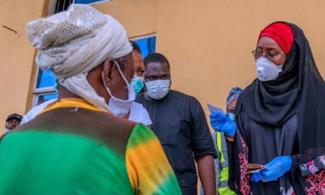
The continued neglect of persons in this category by government would make the impact of the COVID-19 crisis extend for a long period.
Women with special needs in Nigeria have asked the government for a special relief program targeted towards them only.
They also berated their exclusion from the palliative distribution by the Nigerian Government during the COVID-19 lockdown in the country.

The WWDs made known their demands during an online national policy dialogue convened by BONews service in collaboration with FACICP Disability Plus.
Ms Ekaete Judith Umoh of Family Center Initiative for Challenged Persons stated that persons with disability were excluded from different palliatives distribution by the government.
She noted that the continued neglect of persons in this category by government would make the impact of the COVID-19 crisis extend for a long period.
She said, “There is need for the Ministry of Woman Affairs to review its various interventions on gender-based violence to ensure that WWDs are able to participate and benefit in the design, planning, implementation and monitoring of interventions.
“A special COVID-19 relief program for WWDs should be initiated to quickly reach those with very challenging situations. Key component of the special relief for WWDs could include—food support, mobility/assistive aids and micro/small business grants.”
Similarly, Dr Adebukola Adebayo, Disability-inclusion consultant, called on the government and stakeholders to identify and engage organisations of and for WWDs all through the design, planning, implementation and monitoring of all COVID-19 Interventions.
He said, “There is need for the management and staff of the Humanitarian Affairs Ministry to embark on extensive capacity-building towards developing new strategies for inclusion of WWDs in all humanitarian and disaster management interventions.
“There is also a need for rapid sensitisation and capacity-building for health workers to understand the peculiar issues that come with attending to WWDs and PWDs in general.”